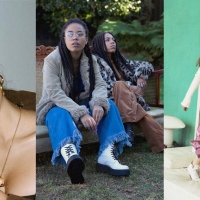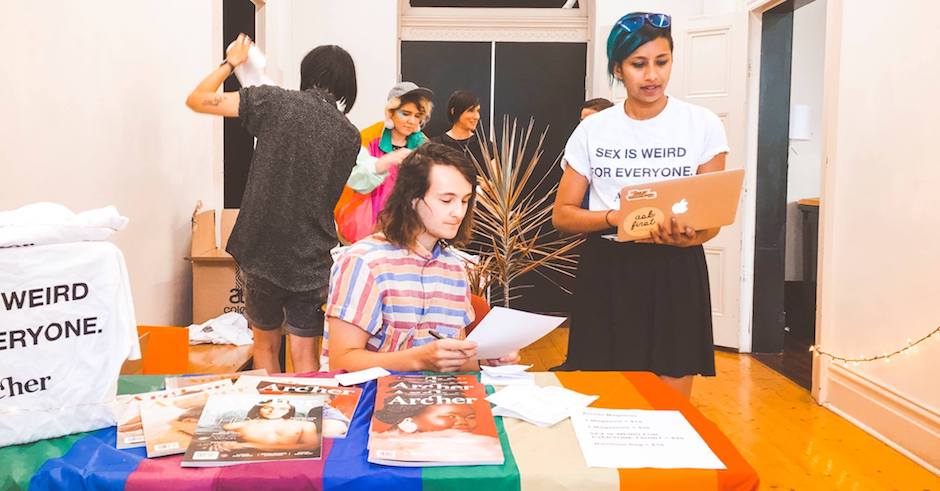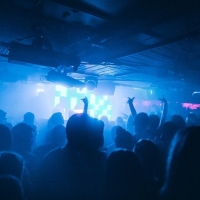 This week's must-listen singles: Sigrid, Jess Kent, The Internet + morePlus, new singles from Kinder and Daft Punk collaborators Parcels.
This week's must-listen singles: Sigrid, Jess Kent, The Internet + morePlus, new singles from Kinder and Daft Punk collaborators Parcels.

Interview: Celebrating ten issues of Archer Magazine with its founder, Amy Middleton
Launched in 2013, the Australian magazine has become an essential part of our media landscape thanks to its coverage of sexuality, gender and identity.
Header photo from Archer Magazine's 'Family Issue' Launch, via Facebook.
Since its inception in 2013, the Melbourne-based, Australia-focused Archer Magazine has become an essential part of the Australian media landscape. While many other magazines have touched on or covered these topics in the past, Archer Magazine's emphasis on sexuality, gender and identity - plus the many facets within these three realms and their overlap - have given voices to those previously unheard, raising issues on behalf of marginalised communities who otherwise, struggle to get any media attention. It's a super important magazine in our publishing world, shining a light on the highs and lows of LGBTQI+ Australians over what's been a pretty wild five years for the community. There's, of course, been the same-sex marriage plebiscite and its devastating effects on the mental health of LGBTQI+ Australians last year, changing rights and laws when it comes to adoption, 'gay panic' defence and trans issues, as well as a general increase in the visibility of LGBTQI+ Australians and their involvement in our socio-political world.
This month they're celebrating their tenth issue - The History Issue - with features on sex work, trans inclusion and queer Indigenous Australians (plus many, many more) included, as well as pieces with William Yang on art and gay liberation and one of our own favourites, Miss Blanks, on music and empowerment. Commemorating the release, we spent a bit of time with the magazine's founder Amy Middleton to talk about the magazine's creation and journey over the last ten issues, plus a bunch more. Check it all out below, and grab the issue (plus their past issues) on Archer Magazine's website HERE.

Archer Magazine, Issue 10.
So first off, how was the idea of Archer Magazine born and what went into launching it as a proper publication?
I came up with the idea for Archer Magazine when I was working at a mag about caravans, back in 2013. Don’t get me wrong – I love caravans as much as the next person… and I’m a journalist, so I’m always working with different subject matter. But it’s always been discussions of sexuality and identity that really get me interested. I was 27 at the time and I was hunting around for my next job after caravans. I was keen to work with people’s stories about sex and gender, but all I found were gay mags and straight mags – nothing seemed to represent everyone’s unique experience. I was a cocky young journo so I decided I could do it myself. Spoiler: it was a lot harder than I was expecting. But it’s been incredibly rewarding. The mag is now sold around the world, including in Barnes and Noble stores across the US, and I manage a team of 12 of volunteers who all contribute in big ways to the mag’s success. The more I step away from the logistical side of things, the more I realise the community is really keen on this platform, people are very willing to get involved and donate their time. It’s pretty special.
The theme of issue #10 is history – can you tell us a bit about the issue and what it includes?
Sure. So this issue is actually the first edition since we launched that I haven’t edited myself – I had a baby in February (yay), and to facilitate my maternity leave, I handed over the editorial reins to Adolfo Aranjuez, a journalist and editor (and dancer and performer and writer and many other wonderful things…) who has done an awesome job with this theme.
Some of my personal highlights include words from Peter Waples-Crowe, who identifies as a queer Aboriginal elder; an article by Greta Parry about trauma and the physical memory; a Q&A with Sydney-based artist William Yang; and a quick look at queerness in comics, written by Lifted Brow founder Ronnie Scott, and illustrated by comic artist Tommi Parrish.
The magazine’s primary focus is sexuality, gender, identity, and everything that comes with the overlap of these. Was there a particular reason why this became the focus of Archer?
These topics are passions of mine, partially because I’m so confounded by them, but also because when I was growing up, I didn’t really see any reflections of my own sexual identity in the media. I experienced sexual desire as a young kid and felt a lot of shame around that because it isn’t a subject that’s discussed openly with young people… or, really, with anyone. As a teenager, I was attracted to all genders, and I fell in love with my best mate. These were terrifying experiences because of the lack of representation and role models around me, and the absence of easily-accessible stories I could relate to. The closest things I could find were movies like Boys Don’t Cry and Chasing Amy, and back in the 90s, most of the queer characters met grisly ends, so it wasn’t a happy experience relating to them. (Everything was OK for Alyssa in Chasing Amy, and she’s a bi character which is cool… but literally, the whole movie is about How Wild She Is!)
This is an alienating scenario to find yourself in, and I reckon it has a lot to do with the poorer mental health outcomes experienced by members of the LGBTIQ+ community.
Archer Magazine’s mission statement is to curate lesser-heard voices on the topics of sex, gender and identity – we publish the stories the rest of the media ignores, in the hopes that we’ll shine some light on just how diverse human sexuality is, and the fact that everyone’s experience is unique, which means there is no ‘normal’.
On top of all this, Archer Mag is a beautifully produced print magazine, which is bloody expensive and (I’m constantly told) counterintuitive in today’s digital age. But I think it’s important for people with marginalised identities and diverse bodies to see themselves in high-quality, glossy media. It feels validating and legitimising in a way, and it helps combat feelings of loneliness or alienation. It also helps foster community: the Archer online community is one of the safest, most welcoming spaces on the internet, and the same can be said for our launch parties. Those are really valuable things for people who feel sidelined by society, or excluded from their families or other institutions.
Over the past few years since Archer’s inception, there have been some massive changes in Australia and the world in regard to these three topics – same-sex marriage, for a recent example. What was the most impactful moment for you within this realm over these years, and what do you want to see done over the next few?
Hannah Gadsby’s Nanette broadcasting on Netflix actually felt pretty amazing. The same-sex marriage ‘yes’ vote was more a relief than anything else. I noticed that most of the people partying that day, at least where I was, were our community’s allies – much of the queer community, including my wife and me, were just so exhausted by the ongoing bullshit that was the plebiscite that we gave one big cheer and then went to bed.
In terms of looking forward, my job is to share stories and work hard to have them heard. It’s up to our leaders to listen, stop and think, and find ways to shift the inequality. I believe change should be up to the oppressors, not the oppressed.
What have been some of the highlights of Archer Magazine over the last ten issues?
We won a Media Peace Prize from the United Nations Association of Australia back in 2016 and it felt great to be acknowledged by such an amazing organisation. I’ve also loved travelling overseas to promote Archer Magazine and finding we already have some readership in far-flung places. I was at a queer party in Brooklyn a couple nights before our first-ever American event, and a local punter was talking about my magazine. I glowed with pride for about a week after that.
Also, this is going to sound cheesy, but every launch event we host is a highlight because watching our little community come together, and seeing how beautifully diverse, how friendly and open and inclusive and impressive they all are, makes all the budgets and stress and deadlines and unpaid labour totally worth it.
What were some of the biggest issues – either for Archer personally or general Australian media – that you’ve faced over the last ten issues, and how have you combatted them?
We experienced some pretty vitriolic online bullying from a certain Daily Telegraph blogger who shall remain nameless in this interview… he placed a link in his stupid blog to our team page, and then let his awful fans ravage my team members with horrible personal comments and weird attacks on irrelevant details. It was gross, and offensive, and upsetting.
My team shared the link amongst themselves and we had an email chain going, throughout which their robustness and noble responses in the face of bigotry made me want to cry with pride and admiration (want to? Who am I kidding? I totally cried.)
That week, I wrote a column for The Age about what pride actually looks like as a queer person in today’s Australia. It was another example of the oppressed being like: You can knock us down, and it hurts, but we’re still OK and we still love being queer so fuck you. I felt pretty happy to have a platform in that moment. Because all that guy has is his band of horrible followers, and it’s a miserable thing to spend your time trading jokes about the appearance of a few advocates half your age who are just trying to make diverse and independent media. Seriously. Get a hobby.
How have you seen the Australian media landscape change since Archer’s inception?
Certainly the stories we publish are becoming more mainstream – when we launched in 2013, there wasn’t much media out there about being trans, for example, or people-centered anecdotal reporting about queer experiences. We’re still working to set an example for the wider media on respectful reporting – to always include the community you’re writing about, rather than reporting on them from a distance, and to always represent people in the way they choose, not the way that suits your narrative or your editorial style – but I think the media is getting there. The industry will always have its bad apples, but their voices feel less and less relevant every year, I’m happy to say.
At the end of the day, we’re a music site – so we gotta squeeze in at least one music Q in here. What are some of your favourite LGBTQI musicians?
Great. Does it sound like nepotism if I reference my wife, Cash Savage, as my favourite Australian LGBTIQ+ musician? The truth is I liked her music before I knew she was going to be my life partner, and I’ve seen her play live more than any other band in the world and it’s still jaw-dropping Every. Single. Time.
Some of my other current local favourites are Spike Fuck and Camp Cope, and I’m a big pop listener, so I’ll give a nod to Sia, who might be my favourite queer musical icon.
Follow Archer Magazine: FACEBOOK
 This week's must-listen singles: Sigrid, Jess Kent, The Internet + morePlus, new singles from Kinder and Daft Punk collaborators Parcels.
This week's must-listen singles: Sigrid, Jess Kent, The Internet + morePlus, new singles from Kinder and Daft Punk collaborators Parcels.
 Is Perth’s Clubbing Scene Doomed?The recent closure of Ambar has Perth DJ Genga thinking long and hard about what’s next.
Is Perth’s Clubbing Scene Doomed?The recent closure of Ambar has Perth DJ Genga thinking long and hard about what’s next.